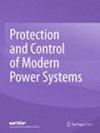“Adaptive virtual synchronous generator control using optimized bang-bang for Islanded microgrid stability improvement”
IF 11.9
1区 工程技术
Q1 ENERGY & FUELS
引用次数: 0
Abstract
Abstract In this paper, a virtual synchronous generator (VSG) controller is applied to a hybrid energy storage system (HESS) containing a battery energy storage system and supercapacitor storage system for maintaining the frequency stability of an isolated microgrid. The microgrid contains a photovoltaic generation system and a diesel generator in addition to the HESS and two constant impedance loads that are fed through a medium voltage radial feeding system. The adaptive virtual inertia constant (H) with constant virtual damping coefficient (D) based on ‘ bang-bang’ control for the microgrid’s frequency stability enhancement is investigated and compared with the constant parameter VSG. In addition, the bang-bang control is modified to adapt the D beside the adaptive H, and the system response is investigated and compared with the conventional adaptive H technique. The VSG parameters are evaluated based on two different methods. The first is a computational method based on the simplified small signal stability analysis, while the other is based on an optimization method using two different objective functions and the particle swarm optimization technique. This paper also investigates the superiority of the proposed technique compared to other techniques in enhancing frequency stability, accelerating steady-state frequency restoration, and reducing the energy requirement of the HESS. The required power from the HESS is shared between the two energy storages using the low pass filter technique so as to reduce battery peak current.基于优化bang-bang的自适应虚拟同步发电机控制提高孤岛微电网稳定性
摘要:本文将虚拟同步发电机(VSG)控制器应用于包含电池储能系统和超级电容器储能系统的混合储能系统(HESS)中,以维持孤立微电网的频率稳定性。微电网除HESS外,还包括一个光伏发电系统和一个柴油发电机,以及两个通过中压径向馈电系统馈电的恒阻抗负载。研究了基于“砰砰”控制的自适应虚拟惯性常数H和恒定虚拟阻尼系数D对微电网频率稳定性的增强作用,并与恒参数VSG进行了比较。此外,除了自适应H外,还对砰砰控制进行了修改以适应D,并对系统的响应进行了研究,并与传统的自适应H技术进行了比较。基于两种不同的方法对VSG参数进行了评估。一种是基于简化小信号稳定性分析的计算方法,另一种是基于两种不同目标函数和粒子群优化技术的优化方法。与其他技术相比,本文还研究了该技术在提高频率稳定性、加速稳态频率恢复和降低HESS能量需求方面的优越性。HESS所需的功率通过低通滤波技术在两个储能系统之间共享,从而降低电池峰值电流。
本文章由计算机程序翻译,如有差异,请以英文原文为准。
求助全文
约1分钟内获得全文
求助全文
来源期刊
CiteScore
20.10
自引率
8.20%
发文量
43
审稿时长
4 weeks
期刊介绍:
Protection and Control of Modern Power Systems (PCMP) is the first international modern power system protection and control journal originated in China. The journal is dedicated to presenting top-level academic achievements in this field and aims to provide a platform for international researchers and engineers, with a special focus on authors from China, to maximize the papers' impact worldwide and contribute to the development of the power industry. PCMP is sponsored by Xuchang Ketop Electrical Research Institute and is edited and published by Power System Protection and Control Press.
PCMP focuses on advanced views, techniques, methodologies, and experience in the field of protection and control of modern power systems to showcase the latest technological achievements. However, it is important to note that the journal will cease to be published by SpringerOpen as of 31 December 2023. Nonetheless, it will continue in cooperation with a new publisher.

 求助内容:
求助内容: 应助结果提醒方式:
应助结果提醒方式:


